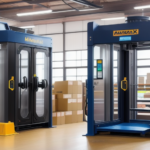Mettler Toledo BC-60 vs Salter Brecknell LPS-400: An In-Depth Comparison
Choosing the right weighing scale for your business or personal needs is crucial for ensuring accuracy, efficiency, and reliability. This comprehensive comparison between the Mettler Toledo BC-60 and the Salter Brecknell LPS-400 will provide you with detailed insights to help you make an informed decision.
Key Features
Mettler Toledo BC-60
The Mettler Toledo BC-60 is a digital weighing scale designed for commercial and industrial applications. It offers a capacity of up to 150 pounds and can measure in pounds, kilograms, or grams. Key features include:
- High-Resolution Display: Large, easy-to-read LCD display with 0.02-pound increments.
- Auto-Shutoff: Conserves battery life by automatically turning off when not in use.
- Multiple Tare Functions: Facilitates the weighing of multiple items without manual adjustments.
- Built-in RS-232 Interface: Enables seamless connectivity to computers for data collection and analysis.
- Durable Construction: Stainless steel platform ensures longevity and easy cleaning.
Salter Brecknell LPS-400
The Salter Brecknell LPS-400 is another robust digital weighing scale tailored for heavy-duty use. It boasts a higher capacity of up to 400 pounds and offers measurements in pounds, kilograms, or ounces. Notable features include:
- Bright LED Display: Large and clear display for easy reading in various lighting conditions.
- Reusable Container Function: Allows efficient weighing of items in different container sizes.
- Auto-Off Function: Extends battery life by shutting down the scale when not in use.
- Low Battery Indicator: Alerts users when battery replacement is needed to prevent downtime.
- Robust Steel Platform: Designed to withstand heavy use and harsh environments.
Performance Comparison
Accuracy
Both the Mettler Toledo BC-60 and the Salter Brecknell LPS-400 provide reliable accuracy, but there are notable differences:
- BC-60: Offers high-resolution measurements with 0.02-pound increments, making it ideal for applications requiring precise weight data.
- LPS-400: Measures in 0.1-pound increments, suitable for general heavy-duty applications where ultra-precision is not critical.
Additionally, the BC-60 features an automatic internal calibration system, ensuring consistent accuracy over time. In contrast, the LPS-400 requires manual calibration, which may introduce potential inaccuracies if not performed correctly.
Capacity
The Salter Brecknell LPS-400 surpasses the BC-60 with a maximum capacity of 400 pounds, making it more suitable for heavier loads. The BC-60's 150-pound capacity is better suited for smaller items requiring higher precision.
Despite the LPS-400's larger capacity, the BC-60's higher precision (0.02 pounds vs. 0.1 pounds) is advantageous for tasks that demand meticulous weight measurements.
Durability
Durability is a key factor in selecting a weighing scale, especially in industrial settings:
- BC-60: Features a stainless steel platform that is resistant to heavy use and easy to clean. However, the tempered glass platform may be more susceptible to damage if mishandled.
- LPS-400: Equipped with a robust steel platform and reinforced load cells, the LPS-400 is designed to endure harsh environments and heavy loads, offering superior durability compared to the BC-60.
For environments exposed to moisture or heavy impacts, the LPS-400's construction provides enhanced protection and longevity.
Price and Value
Pricing is a significant consideration when choosing between these scales:
- Mettler Toledo BC-60: Priced at approximately $250, it offers high precision and portability at a more affordable cost.
- Salter Brecknell LPS-400: Costs around $350, reflecting its higher capacity and enhanced durability.
While the BC-60 is more budget-friendly, the LPS-400's ability to handle heavier loads and its robust build may justify the higher price for users with demanding weighing needs.
Ease of Use
User-friendliness can greatly impact operational efficiency:
- BC-60: Features a fast response time and a rechargeable battery, enhancing portability and reducing the need for frequent battery replacements.
- LPS-400: Equipped with larger buttons and a brighter LED display, it is easier to operate in low-light conditions. The intuitive menu system simplifies navigation through various functions.
Both scales are designed for ease of use, but the BC-60 is preferable for mobile operations, while the LPS-400 excels in stationary, industrial environments.
Maintenance
Proper maintenance ensures the longevity and accuracy of your weighing scale:
- BC-60: Requires regular cleaning of the tempered glass platform and periodic inspection of load cells by a trained technician.
- LPS-400: Features a steel platform that is easier to clean and less prone to damage, with reinforced load cells that demand less frequent inspections.
Battery maintenance is also crucial: the BC-60's rechargeable battery should be kept charged, whereas the LPS-400's AA batteries need timely replacement to avoid operational interruptions.
User Reviews
Pros and Cons of Mettler Toledo BC-60
Users appreciate the Mettler Toledo BC-60 for its accuracy, compact size, and user-friendly interface. The high-resolution display and multiple tare functions are frequently highlighted as major benefits. However, some users have reported that the tempered glass platform can be fragile and that the auto-shutoff feature may activate too quickly, potentially disrupting workflow.
Pros and Cons of Salter Brecknell LPS-400
The Salter Brecknell LPS-400 receives positive feedback for its durability, large LED display, and reliable accuracy under heavy loads. The robust steel platform is praised for its ability to withstand demanding environments. On the downside, some users find the scale noisier than other models and mention that the feet may require adjustment to stabilize the scale on uneven surfaces.
Conclusion: Which Weighing Scale Is Better?
Both the Mettler Toledo BC-60 and the Salter Brecknell LPS-400 offer reliable and accurate measurements suitable for commercial and industrial use. Your choice will ultimately depend on your specific needs:
- Choose the LPS-400 if:
- You need to weigh heavy objects up to 400 pounds.
- Durability and resistance to harsh environments are priorities.
- You prefer a scale with a larger, brighter display and a more intuitive menu system.
- Choose the BC-60 if:
- You require high precision for smaller weight measurements.
- Portability and a compact design are important for your operations.
- You prefer a rechargeable battery for ease of use in mobile settings.
Assessing your specific operational needs, budget, and environmental conditions will help you determine which scale is the better fit for your situation.
Additional Resources
For more information on selecting the right weighing scale for your needs, consider reviewing the following reputable sources:








